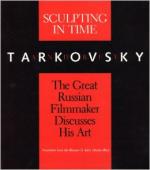
|
| Name: _________________________ | Period: ___________________ |
This test consists of 15 multiple choice questions and 5 short answer questions.
Multiple Choice Questions
1. Who played the role of Adelaide in The Sacrifice?
(a) Anatoliy Solonitsyn.
(b) Effendi Kapiyev.
(c) Susan Fleetwood.
(d) Sarah Moorewood.
2. Who had played the lead in all of Tarkovsky's films prior to The Sacrifice?
(a) Anatoliy Solonitsyn.
(b) Erland Josephson.
(c) Vyacheslav Ivanov.
(d) Effendi Kapiyev.
3. What does Tarkovsky claim to do about a film once he has completed working on it?
(a) Dwells on it.
(b) Re-edits it.
(c) Never sees it.
(d) Stops thinking about it.
4. What artist claimed "no acclaim could please me more than to have ordinary working people wanting to hang my lithographs in their rooms or their workshops"?
(a) Leonardo da Vinci.
(b) Vincent Van Gogh.
(c) Rembrandt.
(d) Picasso.
5. Who wrote the poem quoted in Chapter IX, which begins, "Weary from hunger of spirit / Through grim wasteland I dragged my way"?
(a) Marx.
(b) Pushkin.
(c) Doestoyevsky.
(d) Tolstoy.
6. Who penned the novel, Joseph and His Brothers?
(a) Ernest Hemingway.
(b) Thomas Mann.
(c) Leo Tolstoy.
(d) Alexander Grin.
7. Tarkovsky claims in Chapter V that if he could go back, he would cut out the scene from Mirror with the what?
(a) Cock.
(b) Mother.
(c) Little boy.
(d) River.
8. Where was The Sacrifice filmed?
(a) France.
(b) Sweden.
(c) Italy.
(d) Spain.
9. The hero of The Sacrifice is cured of a disease after sleeping with a what?
(a) Princess.
(b) Angel.
(c) Vampire.
(d) Witch.
10. Tarkovsky claims that In cinema, man's innate drive to what, finds one of its fullest and most direct means of realization?
(a) Self-promotion.
(b) Self-assertion.
(c) Self-destruction.
(d) Self-denial.
11. What director's cinematic version of Macbeth is discussed in Chapter V?
(a) Brunuel's.
(b) Tarkovsky's.
(c) Bergman's.
(d) Kurosawa's.
12. Tarkovsky seriously considered quitting directing after what film?
(a) The Sacrifice.
(b) Ivan's Childhood.
(c) The Mirror.
(d) Stalker.
13. Where was the film, Nostalgia, shot?
(a) France.
(b) Sweden.
(c) Italy.
(d) Spain.
14. In Russian, 'Forgive me', is spoken how?
(a) Plrotoft.
(b) Prosteete.
(c) Regretsy.
(d) Prstost.
15. Who wrote the novel, The Magic Mountain?
(a) Alexander Mann.
(b) Ernest Hemingway.
(c) Thomas Mann.
(d) William Faulkner.
Short Answer Questions
1. Of which French film director does Tarkovsky write of his admiration for concentration?
2. What Russian serf composer appears in Nostalgia?
3. Who was the star of the film, Mirror?
4. Of whom does Tarkovsky write, "wasn't trying to convey his own experience to anyone, he wanted to put across ideas, purely and simply"?
5. Who said, "The function of the image is to express life itself, not ideas or arguments about life"?
|
This section contains 385 words (approx. 2 pages at 300 words per page) |

|




